A Journey of Love in Ecuador
By Tina Tuan (段岱佳)
Abridged and translated by George Chen (陳纘強)
A Journey of Love in Ecuador
By Tina Tuan (段岱佳)
Abridged and translated
by George Chen (陳纘強)
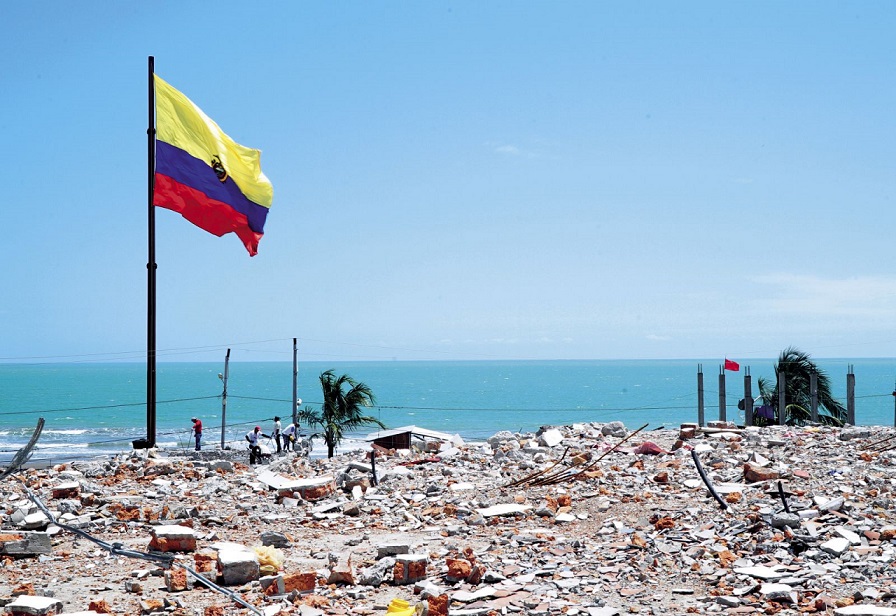
The beautiful coast of Pedernales in Ecuador was strewn with debris from buildings destroyed by the powerful earthquake that struck in 2016. (Photo provided by Tzu Chi Foundation)
Ecuador—which means “equator” in Spanish—is located in South America's northwest, bordered by Colombia to the north, Peru to the east and south, and the Pacific Ocean to the west. As the name suggests, the country straddles the equator.
On April 16, 2016, a 7.8-magnitude earthquake struck the country's Manabi Province on the Pacific coast, severely devastating the cities of Manta, Portoviejo, Pedernales, Canoa, and Jama. The catastrophic disaster killed more than 600 people and left over 10,000 injured.
Upon learning of the disaster, Tzu Chi sent a disaster relief team to Ecuador. U.S. Tzu Chi volunteer Martin Kuo (葛濟覺), who led the relief team of nine volunteers, recalled the situation then. “As the disaster-hit area was very extensive, we had to spend an average of eight to nine hours a day traveling in a car. We had no time to think if we were tired or not, and sleep was just a trivial matter. We only wanted to help the earthquake victims as soon as possible.”
Chaos reigned after the earthquake, making contact with local government officials extremely difficult. With tremendous support from Florencia Hsie (謝妙宏) and Armando Cheng (鄭正勇), Representative and Counselor of the Commercial Office of Taipei in Ecuador at the time, a meeting was finally arranged with then-Mayor of Manta Jorge Zambrano. However, only five minutes was granted for the meeting.
Kuo recollected the meeting, “It's remarkable how it unfolded. When I started talking to the mayor, I immediately felt a strong connection to him. What was to be a 5-minute meeting then stretched to more than an hour of sharing. We explained to him what Tzu Chi wanted to do in Ecuador and what kinds of support we needed from the government. The meeting not only allowed us to share Tzu Chi’s spirit and work with the mayor, but also marked Tzu Chi's first step in disaster relief in Ecuador.”
Local People in Need of Hope
Tzu Chi's disaster relief team found that there were two types of temporary shelters provided to the earthquake survivors. The first type consisted of large, government-funded shelter areas with sufficient aid supplies, and the other consisted of privately-sponsored shelter areas scattered across the affected cities, with supplies generously donated from kind-hearted people in the capital of Quito and the port city of Guayaquil.
Due to management issues, the government later closed down the privately-sponsored shelters and transferred all the survivors to the government shelters. Each shelter area became even larger, offering refuge for thousands of people. The survivors were provided with adequate shelter and sufficient food, but they stared vacantly into the space with each passing day, feeling no hope or motivation to rebuild their homes from the rubble. When Dharma Master Cheng Yen (證嚴上人) learned of the situation, she immediately instructed the relief team to hold a cash-for-work program in the earthquake-hit areas.
The cash-for-work program is a disaster relief approach that Tzu Chi successfully implemented in the Philippines after Typhoon Ketsana devastated the country in 2009. The emergency monetary aid originally planned to be handed directly to the disaster survivors was turned into wages for cleaning up their homes. Through the program, the affected residents not only regained a sense of hope and optimism, but also realized that they don’t need to passively wait for others to help them. They could help themselves by cleaning up their communities and even earn some money doing the work.
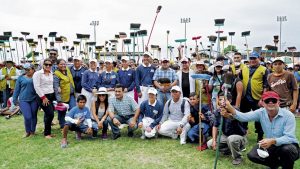
Pedernales residents who joined the cash-for-work program to clean up their community happily posed with Tzu Chi volunteers for a picture. (Photo provided by Tzu Chi Foundation)
Designed with empathy in mind, the cash-for-work program puts the needs of the affected residents first. By turning relief money into wages, the survivors can do work that helps them move on with hope and dignity. In 2013, after Typhoon Haiyan ravaged the Philippines, Tzu Chi again implemented the cash-for-work program, which was featured in an article in Wall Street Journal.
Having helped with disaster relief work in the Philippines after Typhoon Haiyan, Kuo was instructed by the Master to carry out the cash-for-work program in Ecuador. On May 6, 2016, the program was first launched in Portoviejo.
Launching the Cash-for-Work Program
“In the beginning, people were suspicious of our motives. They wondered why a group of foreign strangers would come such a long way to offer them such an opportunity?” Kuo said. On the program's first day in Portoviejo, only 120 residents showed up. Tzu Chi volunteers divided them into teams of ten people each to clean up areas designated by the city government. Their work focused on clearing debris on the streets near collapsed buildings.
After each of the residents who participated in the first day of the program received US$15 for their cleanup work, word of mouth spread quickly, and the number of participants increased significantly. The cash-for-work program soon had over 1,000 people joining each day. Starting from Portoviejo, Tzu Chi volunteers moved north along the coast to launch the cash-for-work program in the cities of Manta, Canoa, and Pedernales. With coverage in the local media, the program was known all over Ecuador, so in the final days of the program which was held in Pedernales, the number of participants reached almost 3,000 each day.
Every day of the program, before the cleaning teams set off to work in their designated areas, Tzu Chi volunteers shared with the participants about the story of Tzu Chi's beginnings. In 1966, Master Cheng Yen gave each of her followers—30 housewives in total—a bamboo coin bank to save 50 cents a day, which was spared from their grocery money to help people in need. Over time, the small group with humble beginnings has grown to become a Buddhist NGO doing charity work around the world. The volunteers wished for the locals to understand that even if we don't have much to give, when we harbor good thoughts and give for others everyday, love and goodness can accumulate to make a great difference. Everyone can tap into the deep wisdom and infinite possibilities that is at the heart of the story.
The words of Tzu Chi volunteers were translated into Spanish by local volunteer Jenyffer Ruiz, who added her own rallying cry to motivate and encourage the local participants. “Let’s work hard together for our city! Go! Go! Go!”
“Doing Tzu Chi's work can truly develop one’s potential,” said Kuo. “Although volunteering in the disaster zones is exhausting, we really just want to find ways to relieve survivors from their suffering. With Tzu Chi volunteers' support in the disaster areas, smiles have reappeared on the local people's faces, and rays of hope can be seen in their eyes. Through the cash-for-work program and a call to donate money into coin banks, Tzu Chi has helped the survivors regain their dignity and realize that even if they have to receive help from others, they still have the power to give and help others as well.”
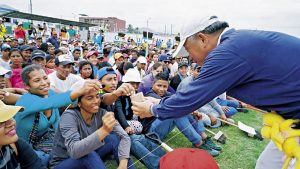
Having participatedin the cash-for-work program in Pedernales, residents donated money after Tzu Chi volunteers shared with them the story of Tzu Chi's bamboo banks. (Photo provided by Tzu Chi Foundation)
When participants of the program received their wages after finishing a day’s work, they all broke into resplendent smiles. For many, this was their first time receiving wages after the disaster. When they saw the streets—once strewn with debris—turn clean again, they could see the possibility of rebuilding their homes. Many participants said that they will use the money to rebuild their houses so they can leave the shelter and return home sooner.
A Cycle of Goodness
Jama, one of the coastal cities hardest hit by the earthquake, is located between Canoa and Pedernales. When Angel Rojas Cevallos, then-Mayor of Jama, learned about the cash-for-work program in the news, he thought Tzu Chi volunteers would travel north along the coast and eventually reach Jama to launch the program. While the mayor anxiously waited, he got wind that Tzu Chi was already in Pedernales, so he immediately traveled there to appeal for Jama's inclusion in Tzu Chi's cash-for-work program.
When Tzu Chi volunteers told the mayor the program was about to end and the funds were almost used up, he broke down in tears. Moved to tears too by the mayor's plea, Kuo decided to try what he could to help and came up with US$15,000. But, this amount could only pay 1,000 people for a day’s work. What if more than 1,000 people showed up? To everyone’s surprise, Mayor Cevallos said, “If more people show up, I'll pay them with my own money!”
Tzu Chi immediately made the decision to bring the cash-for-work program to Jama. As expected, more than 1,000 residents turned up, and the mayor did as he said, paying US$4,200 in total for the wages of 280 people. When the disaster relief team reported this to the Master, she instructed Kuo to immediately repay the money to Mayor Cevallos.
By then, the team was already in Canoa, a 5-hour drive from Jama. Kuo and Ruiz decided to head back immediately to Jama and return the money to the mayor, so they drove back as night fell. Along the bumpy road, the chassis of the car hit a rock and caught fire, but Kuo and Ruiz were still unaware of the situation until drivers from the opposite direction shouted at them to stop. They stopped the car in the middle of a sharp bend, which was a dangerous location as there were vehicles traveling from both directions. Luckily, a driver voluntarily parked his large vehicle at the bend to block other vehicles and used his extinguisher to put out the fire. Another driver also stopped to help push the damaged car to a safer spot while they waited for the tow truck.
Kuo recalled the accident. “We were really blessed and protected. At the most critical moment, many kind-hearted Ecuadorians came and helped us. They suddenly appeared from nowhere, and then disappeared again without leaving their names or contact. It was extraordinary!”
Within a month, Tzu Chi completed 34 sessions of cash-for-work program, benefitting 34,000 residents. Tzu Chi volunteers from Argentina, Brazil, Paraguay, the Dominican Republic, Taiwan, and the U.S. arrived to help. These volunteers worked in relays and shifts to offer the local volunteers critical support in conducting the disaster relief. Tzu Chi volunteers also organized free clinics and distributed emergency cash, hygiene products, nutritional supplements for young children, etc.
The cash-for-work program had not only enabled cities devastated by the earthquake to slowly recover, it also helped the local residents to gain new experiences. Traditionally in Ecuador, housework was the work of women, and men would not even touch a broom. But, to participate in the cash-for-work program, Ecuadorian men took up cleaning tools to work, creating a remarkable sight to behold in the communities.
The mayor of Pedernales said, “I have never seen this kind of discipline among the residents of my city. They behaved so orderly, waited in lines, and even remained quiet among such a large crowd. What did you Tzu Chi volunteers do to them?”
The Selfless Giving of Experienced Volunteers
As Ecuador started to recover from the devastation brought by the earthquake, torrential rains in the first quarter of 2017 swept through South America for days and brought massive destruction. The heavy rains severely hit three provinces in Ecuador, leaving 120,000 people affected.
Tzu Chi had already trained a group of local volunteers in Ecuador after the 2016 earthquake, including Ruiz, who was also affected by the torrential rains. Her house was damaged with a sinkhole right in the courtyard. However, she was more concerned about the plight of other people affected by the rains and floods. She said to herself, “No matter how challenging the situation is, I'll still go help!” Ruiz courageously went to survey the disaster areas and reported back to Tzu Chi's headquarters in Hualien. She also contacted Martin Kuo, who happened to be in Hualien attending the board meeting for Tzu Chi USA.
Tzu Chi's headquarters agreed to provide disaster relief to the flood survivors in Ecuador. Tzu Chi volunteers from Argentina, Brazil, Canada, Guatemala, Paraguay, the Dominican Republic, and the U.S. traveled to Ecuador's Portoviejo and Santa Ana in the Province of Manabi to work with the local volunteers. A cash-for-work program was held, inviting residents to clean up mud and garbage to prevent communicable diseases. More than 18,000 residents participated in the program. Furthermore, Tzu Chi also gave out emergency cash to nearly 2,100 households affected by the floods.
To carry out the disaster relief in Ecuador, U.S. Tzu Chi volunteers Martin Kuo, George Chang (張濟舵), Debbie Chen (林慮瑢), and Simon Shyong (熊士民), all with much experience in international disaster relief, travelled frequently between the U.S. and Ecuador. These volunteers in their sixties that make up a super team filled in for each other while supporting disaster relief in other parts of the world. Upon Master's request, they will immediately put aside all personal matters to conduct relief work around the globe. Changing flight reservations, lost luggage, insufficient change of clothes, and other inconveniences are a normal part of their travels. These Tzu Chi volunteers are only focused on relieving the suffering of other people, and it is because of their selfless giving that Tzu Chi's love and spirit could be brought to Ecuador.
Spreading Seeds of Love in Ecuador
Ecuador was part of the Inca Empire during the 15th century and was colonized by Spain in the 16th century. The Spanish introduced Catholicism, which would remain the country's major religion even after it gained independence. Now, more than 80% of Ecuadorians are Catholics.
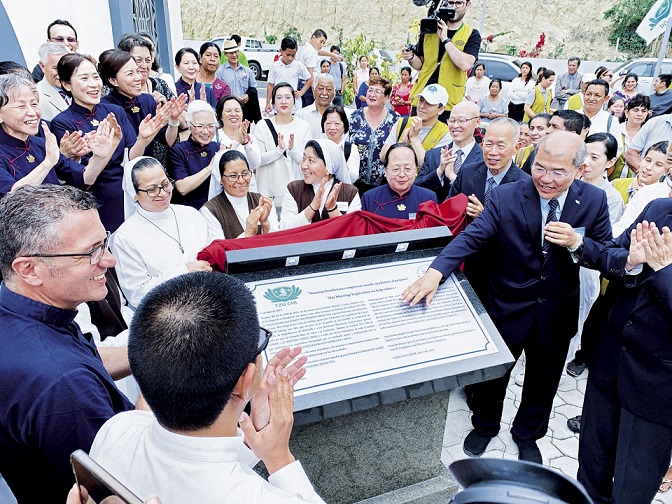
After the ribbon cutting ceremony was held at the rebuilt San Andres Church of Canoa, Martin Kuo introduced a plaque commemorating the collaboration between Tzu Chi and Canoa. (Photo by Tina Tuan)
When Tzu Chi's disaster relief team went to Canoa to survey the disaster after the 2016 earthquake, they found destroyed the historical Catholic church—the spiritual center for the local residents. When the Master learned about it, she instructed Tzu Chi volunteers to rebuild the church.
Canoa means "boat" in Spanish. The San Andres Church of Canoa, which has been rebuilt in its original location, has been designed to be shaped like a large ship. During the reconstruction, the local men were hired as workers and the local women were hired to cook delicious vegetarian food for the workers. With work provided by Tzu Chi to rebuild the church, the local residents could earn money and regain their dignity.
At the inauguration ceremony of the reconstructed church, the local bishop, nuns, and officials came to the stage to express their gratitude to Tzu Chi. The local residents brought hand-made gifts for each Tzu Chi volunteer at the ceremony, sang a self-composed song about the reconstruction, and brought lively dance performances for the 700 guests. At the end, everyone sang the Spanish version of the Tzu Chi song, “We are One Family.”
Boris Garcia, contractor for the church reconstruction, was deeply moved by the ceremony. Formerly a firefighter working for the U.S. Army Special Forces, Garcia was away from his home country for seven years. He worked in the frontlines of war, putting out fires following shootings and bombings. After witnessing many deaths caused by war for three years on the battlefield in Afghanistan, he decided to return to his hometown to be with his family and cherish every moment with them.
Garcia got to know about Tzu Chi through a relative who works in Manta's city government and who was responsible for supporting Tzu Chi with the cash-for-work program. Garcia helped maintain order at the venue. “I have learned Tzu Chi's spirit and values from observing Martin in action. In every activity, he was always the first to arrive and the last to leave. He would fulfill all of the Master’s requests despite any challenges, and he also took great care of every volunteer. Jenyffer [Ruiz] and I were the first local volunteers, and he went out of his way to make sure we were both well taken care of. I saw Martin shed tears many times with sadness because he couldn't help everyone in need of aid.”
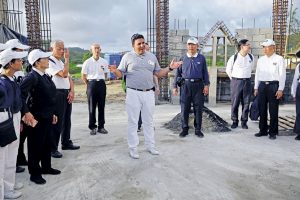
In early 2019, local volunteer Boris Garcia (middle) reported the progress of the church reconstruction to Tzu Chi volunteers, who have continued to support local survivors after the 2016 earthquake. (Photo by Luca Ye)
When the local residents did not see much progress a year after the groundbreaking ceremony for the church reconstruction, some people remarked that Tzu Chi volunteers were “all talk and no action.” Garcia was saddened, not only because of the remarks, but also because he saw Kuo's health visibly decline from the immense pressure.
In November 2017, Garcia visited Tzu Chi's headquarters in Hualien and learned that the Master never wavered in her promise to rebuild the church, requesting Tzu Chi volunteers to place top priority to the project. When Garcia returned to Ecuador, he took the initiative to become the contractor for the project. He said, “I took on the contractor role not for the money, but because I saw how Master cared for the project, how many Tzu Chi members came to help my country, and how it was too overwhelming for Martin. I wanted to do more.”
Martin Kuo graduated from Taiwan’s Fu Jen Catholic University with a degree in German Studies. A self-made entrepreneur, Kuo had encountered hardships when he first started his business in the U.S. During the most challenging of times, he only had US$200 to survive, but he vowed success. Now, he has become a successful entrepreneur with a happy family.
When Martin achieved success, he started frequenting casinos in Las Vegas to gamble in VIP rooms reserved only for tycoons. His company's general manager, Chen Ci-Jiang (陳慈江), is a Tzu Chi volunteer who always hoped Kuo could join Tzu Chi. Following the 1999 earthquake in Taiwan, Kuo started to donate regularly to Tzu Chi, but he hasn't yet volunteered in activities. It was not until 2003 when a massive fire in San Diego burnt down many luxurious mansions overnight that Kuo realized for the first time that everyone stands equal when disaster strikes. No one, regardless of fortune, is spared from suffering. He decided to become a Tzu Chi volunteer and was certified in 2007 with the Dharma name Ji Jue (濟覺) as bestowed by the Master.
Following the 2016 earthquake in Ecuador, Martin gave his all to groom a group of local volunteers. His years of experience in international disaster relief made him realize that only when there are committed local volunteers can Tzu Chi’s spirit of love firmly take root in the country.
Local volunteer Ruiz said, “If it wasn't for Martin, I wouldn't become a Tzu Chi volunteer.” Ruiz lived in the U.S. for 24 years working as an educator and speech therapist, and she has learned about Buddhism and Zen meditation. In 2015, she took an early retirement and returned to Ecuador with the aim to use her professional knowledge to contribute to society. After the earthquake struck in 2016, through the introduction of a friend, Ruiz helped with the translation for Tzu Chi's disaster relief team. From then, she became Tzu Chi first local volunteer in Ecuador.
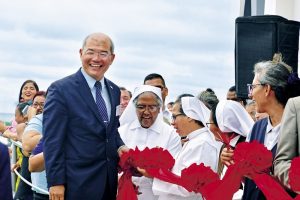
Nuns prepare the ribbon for the inauguration ceremony of San Andres Church of Canoa. Martin Kuo, standing beside the nuns, said that the church rebuilding project was the fruit of Catholics and Buddhists working together with mutual trust. (Photo by Tina Tuan)
“Every time I encountered difficulties, Martin would be there to help me within minutes, and he always comforted me with a brotherly hug. I have no brothers, but Martin, Boris and I have become like a family.” The three of them worked together for almost three years in the church reconstruction project. They had their differences in opinion, but in the process, they have formed a very close bond.
When Kuo was asked if he ever thought of giving up the church reconstruction project during the most difficult moments, he readily responded. “Of course I did!” However, if he really did give up on this project, how could Tzu Chi develop in this country? So, giving up was never an option.
With the Master's gentle guidance and instructions, Kuo put aside all his worries and travelled between the U.S. and Ecuador to work on the reconstruction project. In the process, he also supported Ruiz and Garcia to become Ecuador's first two local volunteers. After the San Andres Church of Canoa was inaugurated, eight local residents also became Tzu Chi volunteers, wearing Tzu Chi's grey uniform and volunteer badges. There were also residents from Canoa and its neighboring cities stepping forward to support Tzu Chi's activities.
“It is great to see so many locals attend the inauguration of the church in Canoa and more local people joining Tzu Chi's volunteer program. In the future, we will also hold vocational training programs in the church. The possibilities that we envisioned and dreamed of have slowly come to fruition,” expressed Kuo with joy. All of the trials and tribulations were worth it.
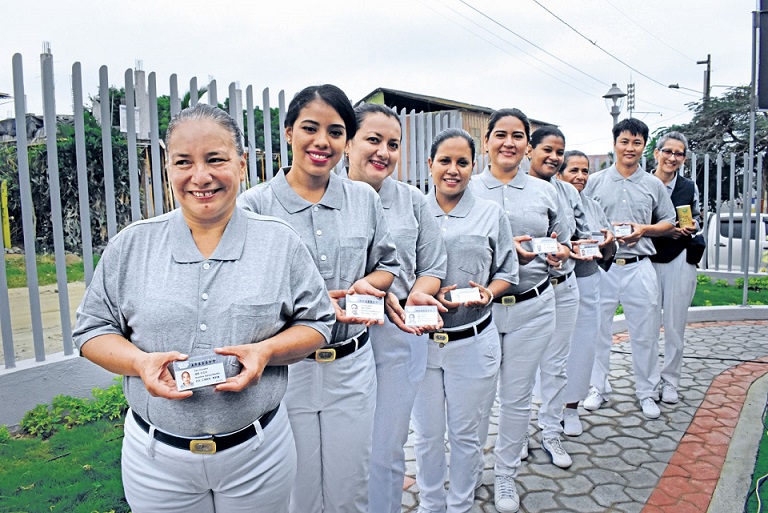
The Tzu Chi Medical Association held a free clinic in the newly reconstructed church in Canoa. Before the clinic started, a ceremony was held for eight local volunteers to receive their volunteer certificates. Ecuador's first local volunteer Jenyffer Ruiz (first from right) vowed to spread Tzu Chi in her country. (Photo by Wendy Tsai)
Contact Us | Plan a Visit | Donate
8 Lide Road, Beitou 11259, Taipei, Taiwan
886-2-2898-9999
005741@daaitv.com
©Tzu Chi Culture and Communication Foundation
All rights reserved.
